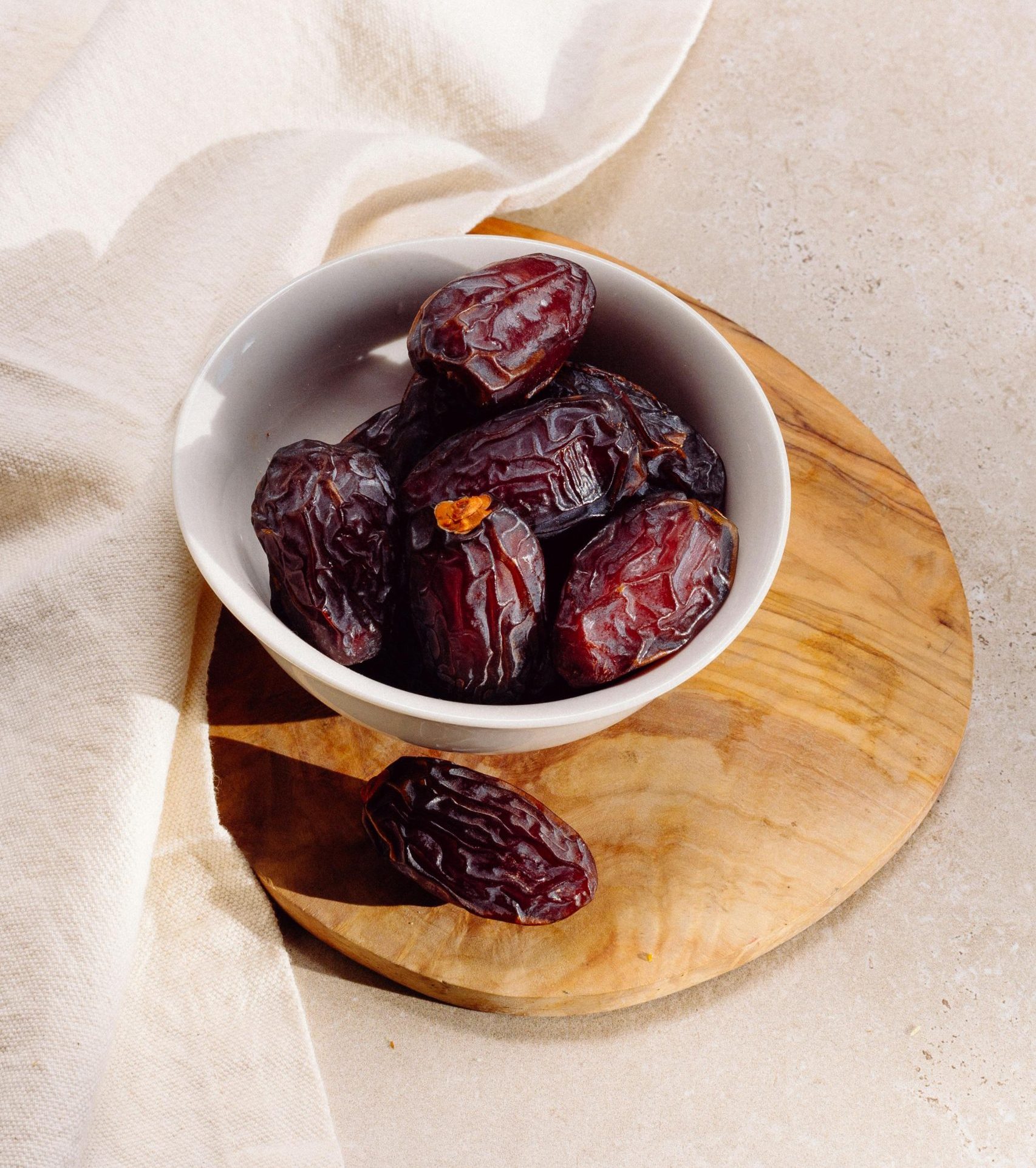Introduction to Benefits of Dry Dates
Dry dates, also known as khajoor, are a cherished fruit that has been consumed for centuries. These little nuggets of sweetness have a rich history that dates back to ancient times, where they were a staple in Middle Eastern and Mediterranean diets. Today, they’re cultivated in many parts of the world, including California, Iran, and Egypt, and are available in a variety of forms and flavors.
The cultivation of dry dates involves drying fresh dates either under the sun or in controlled environments to reduce their moisture content, ensuring the best dry dates are produced. This process not only extends their shelf life but also concentrates their natural sugars, making them an excellent source of energy. Varieties like Medjool, Deglet Noor, and Zahidi each bring their unique texture and taste to the table, offering something for every palate.
In this blog post, we’ll explore the nutritional value, health benefits, and versatile culinary uses of dry dates. Whether you’re a health enthusiast, vegan, food blogger, or bodybuilder, you’ll find plenty of reasons to incorporate dry dates into your diet.
Nutritional Value of Dry Dates
Dry dates are a nutritional powerhouse packed with essential vitamins and minerals, offering numerous health benefits of dates. They are rich in fiber, which aids digestion and helps maintain a healthy gut, making eating dates a beneficial choice. A 100-gram serving of dry dates provides about 277 calories, making them an excellent energy booster.
These dried fruits are also abundant in potassium, magnesium, and calcium, which are crucial for bone health and muscle function, making them one of the best dry options available. Additionally, dry dates contain significant amounts of iron, helping to prevent anemia and increase overall vitality. Their high antioxidant content, including flavonoids, carotenoids, and phenolic acid, helps combat oxidative stress and inflammation.
Let’s not forget the natural sugars—mainly glucose and fructose—that provide a quick energy boost, making dry dates a great pre-workout snack. In summary, incorporating dry dates into your diet can offer a wide array of nutritional benefits, including the energy boost from yellow dry dates.
The Health Benefits of Consuming Dry Dates Regularly
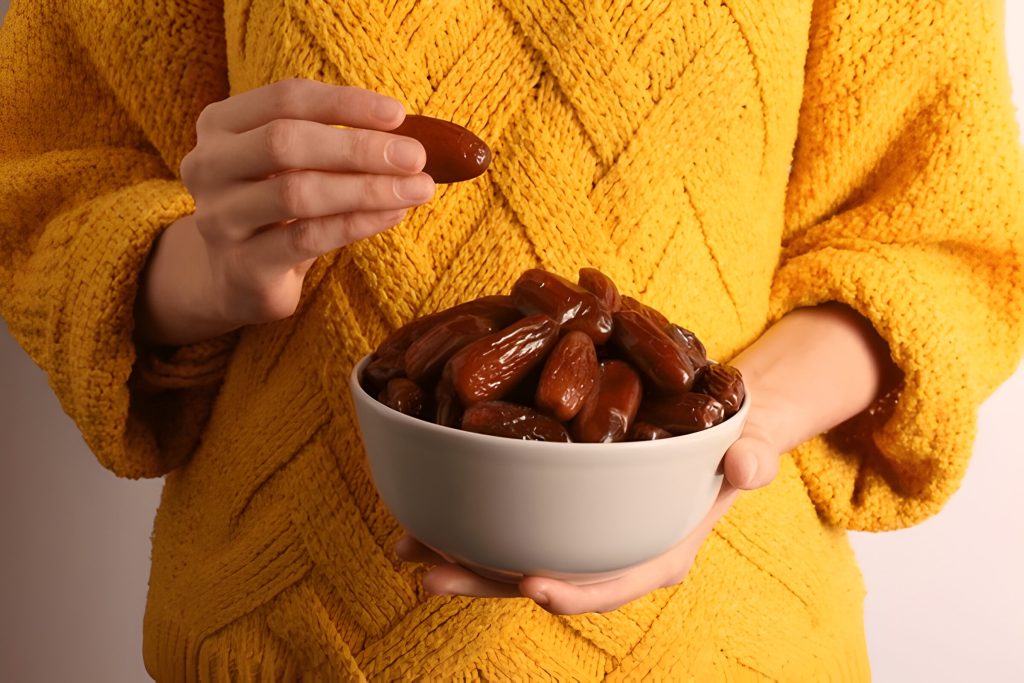
Eating dry dates regularly can significantly improve your overall health. One of the most notable benefits is their role in improving digestive health. The high fiber content in dry dates helps prevent constipation and promotes regular bowel movements.
Dry dates also support heart health. Their potassium content helps regulate blood pressure, reducing the risk of hypertension and stroke. Additionally, the antioxidants in dry dates help reduce cholesterol levels, further protecting your heart.
For those looking to boost their bone health, dry dates are an excellent choice. The combination of calcium, magnesium, and phosphorus strengthens bones and reduces the risk of osteoporosis. Furthermore, dry dates are beneficial for pregnant women as they help maintain energy levels and provide essential nutrients for both the mother and the baby.
Incorporating Dry Dates into Different Diets
Dry dates are incredibly versatile and can be easily incorporated into various diets. For vegans, dry dates are a natural sweetener that can replace refined sugars in recipes. They are also a great addition to smoothies, energy bars, and desserts, particularly when using khajur for added sweetness.
Bodybuilders can benefit from the high-calorie content and natural sugars in dry dates. They make an excellent pre- or post-workout snack, providing a quick energy boost and aiding muscle recovery, especially when paired with ajwa dates. Pairing dry dates with milk, often called “khajoor with milk,” can enhance protein intake and overall nourishment.
Food bloggers can experiment with dry dates in a plethora of recipes, from savory dishes to sweet treats. Their unique flavor and texture can elevate any dish, making it both nutritious and delicious. Whether you’re following a specific diet or simply looking to add more variety to your meals, dry dates are a fantastic option.
How to Select and Store Dry Dates for Maximum Freshness
Choosing the right dry dates is essential for maximizing their flavor and nutritional benefits, especially when considering the dry dates price. Look for dates that are plump, with a slightly glossy surface and no signs of mold or crystallization, as these are indicators of the best dry dates. The skin should be intact and free from wrinkles.
To store dry dates, keep them in an airtight container in a cool, dry place. They can last for several months when stored properly. For extended shelf life, you can refrigerate or freeze them. Just make sure to bring them to room temperature before consuming to enjoy their full flavor.
Proper storage not only preserves their taste but also maintains their nutritional value. By selecting and storing dry dates correctly, you can ensure that you always have a healthy snack on hand.
Delicious Dry Date Recipes for Snacks, Meals, and Desserts
Dry dates are a versatile ingredient that can be used in a variety of recipes. Here are a few delicious ideas to get you started:
Dry Date Energy Balls
Combine pitted dry dates, almonds, cocoa powder, and a pinch of salt in a food processor. Roll the mixture into small balls and refrigerate. These energy balls make a perfect on-the-go snack.
Stuffed Dates with Almond Butter
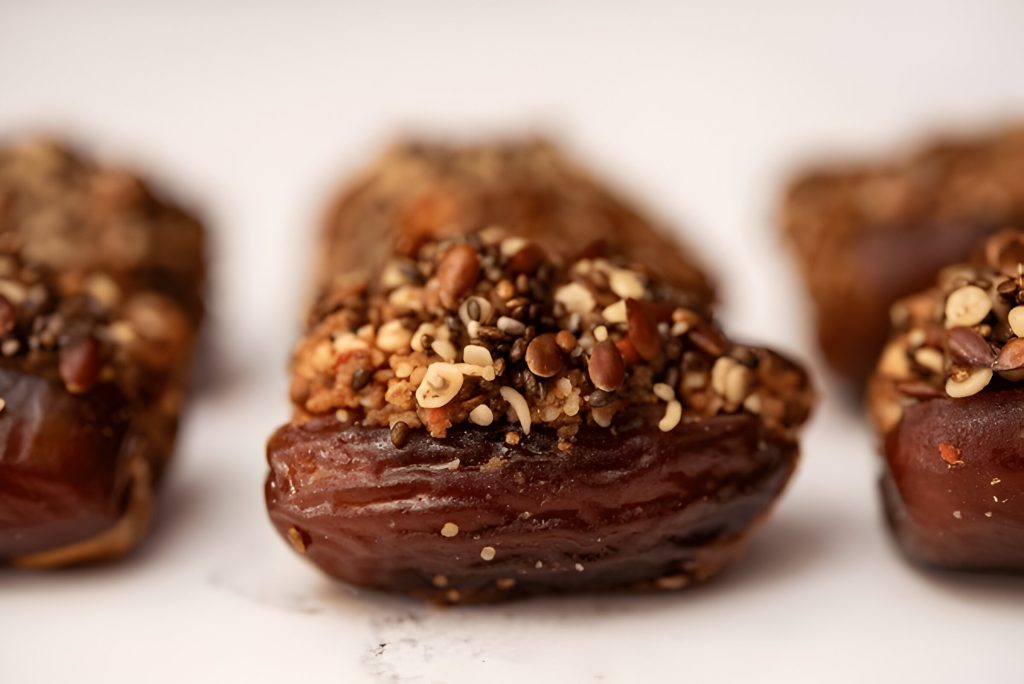
Pit the dry dates and fill them with almond butter. Top with a sprinkle of sea salt and a drizzle of honey. This simple yet indulgent treat is perfect for satisfying your sweet tooth.
Date and Nut Bread
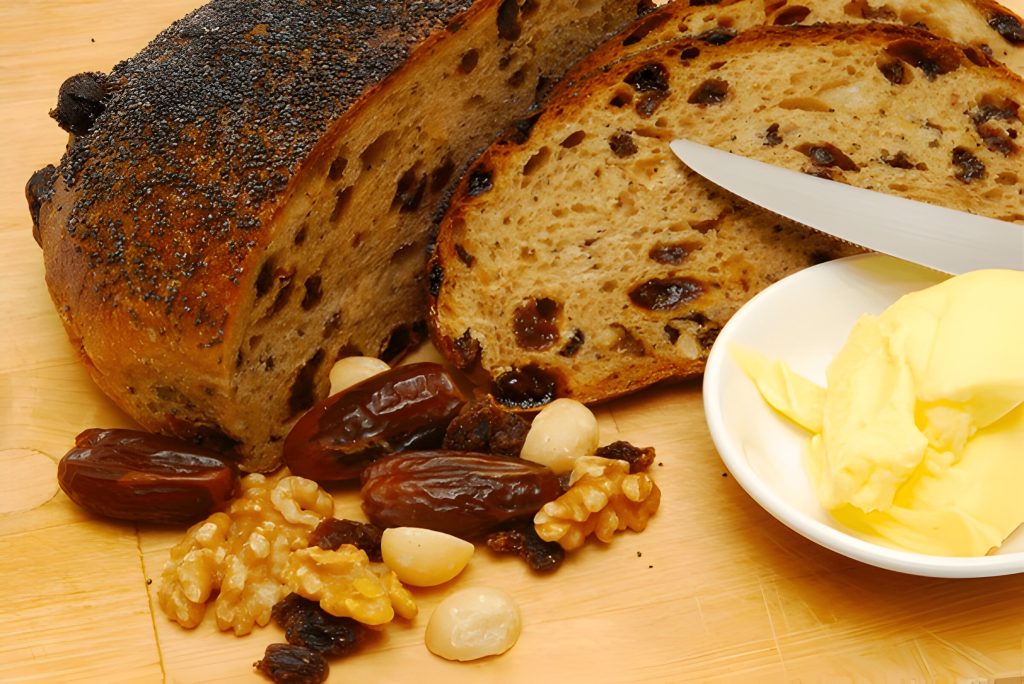
Mix whole wheat flour, chopped dry dates, walnuts, and baking soda in a bowl for a nutritious treat that highlights the health benefits of dates. Add in a mixture of milk, eggs, and vanilla extract. Bake until golden brown. This hearty bread is perfect for breakfast or as a snack.
Khajoor Milkshake
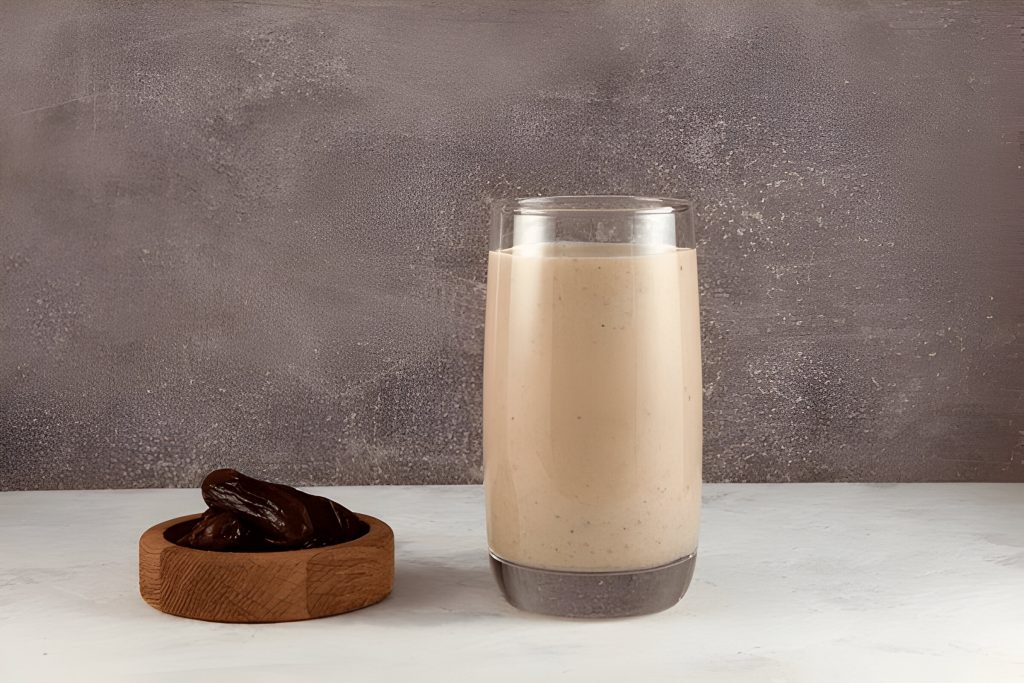
Blend dry dates with cold milk and a pinch of cardamom powder. This creamy and nutritious milkshake, known as “khajoor with milk,” is a great way to enjoy the benefits of dry dates in a delicious drink.
These recipes are just a starting point. Feel free to get creative and incorporate dry dates into your favorite dishes. Their natural sweetness and rich flavor can enhance a wide range of culinary creations.
FAQ
What is the benefits of dry dates?
Dry dates, also known as khajur or chuara, offer several benefits and are a popular choice for health-conscious individuals. These chewy fruits from the date palm tree are not only delicious but also packed with nutrients. Eating dates regularly can provide numerous health benefits. Dates are rich in essential vitamins, minerals, and antioxidants, making them a valuable addition to your diet. You can find various types of dates, such as ajwa dates, deglet noor dates, and yellow dry dates, each with its unique flavor profile and potential health benefits.
Dates may improve digestive health due to their high fiber content. A single serving of dates contains several grams of fiber, which aids in digestion and promotes regular bowel movements. The fiber in dates also helps to control blood sugar levels and promote a feeling of fullness. Additionally, dates are used as a natural sweetener, making them an excellent alternative to added sugar in recipes. Their chewy texture and sweet taste make them perfect for snacking or adding to various dishes. You can find best quality dates in different packaging options, such as 1kg packs, 500 grams, or 500gm bags, to suit your needs.
Including dates in your diet can support overall health and aid in various bodily functions. They are often consumed with other nuts like cashew for a nutritious snack. You can also find dried dates powder, which is versatile and easy to incorporate into smoothies or baked goods. When shopping for dates, look for best dry options from reputable sources, such as those from Saudi Arabia. Many online retailers offer dates online, making it convenient to purchase quality dried dates.
How many dry dates to eat per day?
Determining how many dry dates to eat per day largely depends on one’s dietary goals and health conditions. Dry dates, or chhuhara, are a delicious snack that offer a source of natural sweetness and are rich in vitamins and dietary fiber. Typically, consuming around 4-6 dry dates daily is considered beneficial. Dry dates provide around 7 grams of fiber per 100 grams, which is important for preventing constipation and maintaining gut health. They also supply a small amount of protein and are a source of nutrients that can support various bodily functions.
When consumed in moderation, dry dates may help reduce conditions like osteoporosis, owing to their mineral content. For pregnant women, incorporating dry dates during the last few weeks of pregnancy may assist in smoother labor due to their oxytocin-like effects. However, it is always recommended to consult with a healthcare provider for personal guidance. Additionally, dry dates can aid in weight management as they are relatively low in calories but can curb sweet cravings effectively. With both soluble and insoluble fibers, they support digestive health and may lower cholesterol levels.
Another benefit of dry dates is their versatility; they can be used as a natural sweetener in various recipes and make for a great snack alternative to processed sweets. When purchasing dry dates, it is essential to ensure the quality of products. The Food Safety and Standards Authority of India (fssai) sets guidelines to help consumers choose the best quality products. Look for best prices and convenient options like cash on delivery when shopping online. Whether choosing wet dates or chuhara, incorporating them into your diet can provide numerous potential health benefits, making them a worthy addition to a balanced lifestyle.
Who should not eat dry dates?
Dry dates, depending on the variety, are a nutritious and sweet and chewy fruit that many people enjoy. They are packed with vitamins, minerals, and fiber, which can help lower the risk of various health issues. Dry dates also make a great snack for those looking for a natural energy boost. However, despite their numerous health benefits, there are certain groups of people who should exercise caution or avoid consuming dry dates altogether. Individuals with diabetes should be careful when eating dry dates due to their sweet nature and high sugar content.
While dates have a lower glycemic index compared to other sugary snacks, they can still cause blood sugar spikes if consumed in large quantities. People with allergies to dried fruits or sulfites (often used as a preservative) should also avoid dry dates. Additionally, those following a low-carb or ketogenic diet may want to limit their intake of dates, as even a small 500g pack can contain a significant amount of carbohydrates. Pregnant women should consult their healthcare provider before consuming large quantities of dry dates, as some studies suggest that excessive intake may lead to complications. Individuals with digestive issues or irritable bowel syndrome may find that the high fiber content in dates exacerbates their symptoms.
Lastly, those with dental problems or sensitive teeth may want to avoid dry dates, as their sticky texture can potentially damage dental work or cause discomfort. It’s worth noting that certain varieties of dates, such as the shaheen date, may be more suitable for some individuals due to their softer texture and lower sugar content. As with any dietary change, it’s always best to consult a healthcare professional before incorporating dry dates into your regular diet, especially if you have pre-existing health conditions.
Does dry dates increase sperm?
There has been ongoing interest in the potential health benefits of various foods, including dry dates, in improving reproductive health and increasing sperm count. Dry dates are packed with essential nutrients such as vitamins, minerals, and antioxidants that can contribute to overall well-being. They contain high levels of vitamin A, vitamin C, and vitamin B-complex, as well as minerals like potassium, magnesium, and zinc, which are critical for maintaining reproductive health.
The presence of antioxidants in dry dates helps to neutralize free radicals that can damage sperm cells, thereby potentially improving sperm quality. Additionally, the high zinc content in dry dates is particularly beneficial as zinc plays a crucial role in the production and motility of sperm. Studies have shown that a deficiency in zinc can lead to reduced sperm count and poor sperm quality, making dry dates a valuable addition to the diet for those looking to improve their reproductive health.
Moreover, the natural sugars in dry dates, such as glucose and fructose, provide a quick energy boost, which can be beneficial for overall stamina and vitality. This, in turn, can improve sexual performance and potentially increase the likelihood of conception. The dietary fiber in dry dates also promotes better digestion and absorption of nutrients, ensuring that the body receives the maximum benefit from the foods consumed.
While dry dates offer numerous health benefits, it is important to remember that they should be consumed as part of a balanced diet. Relying solely on dry dates to increase sperm count may not be sufficient. A holistic approach that includes a variety of nutrient-rich foods, regular exercise, and a healthy lifestyle is essential for optimal reproductive health.
Who should not eat dates?
Dates are a nutritious fruit that many people enjoy, but they are not suitable for everyone. Firstly, individuals with allergies to dates or any of their components should avoid consuming them. Allergic reactions can include symptoms such as itching, swelling, or even anaphylaxis in severe cases. It is crucial to consult with a healthcare provider if you suspect you have an allergy to dates or any related fruits.
Secondly, people with diabetes should be cautious when consuming dates. Dates have a high glycaemic index and contain a significant amount of natural sugars, which can cause a rapid spike in blood sugar levels. Diabetics should monitor their carbohydrate intake and possibly consult a dietitian to incorporate dates into their diet safely, if at all.
Thirdly, individuals who are trying to lose weight may want to limit their consumption of dates. Despite being rich in fiber and essential nutrients, dates are also calorie-dense and high in natural sugars, which can contribute to weight gain if not eaten in moderation. People on calorie-restricted diets should be mindful of their portion sizes and consider dates as an occasional treat rather than a daily snack.
Lastly, people with irritable bowel syndrome (IBS) or other digestive disorders might find dates problematic. Dates are high in fiber, which can exacerbate symptoms such as bloating, gas, and diarrhea in sensitive individuals. For those with IBS, it is advisable to follow dietary guidelines provided by a healthcare professional to manage their symptoms effectively.
In summary, while dates are a nutritious fruit that can provide various health benefits, they are not suitable for everyone. Individuals with allergies, diabetes, weight management issues, or digestive disorders should consult with healthcare providers to determine whether dates can be safely included in their diet.
Are dried dates good or bad for you?
Dried dates offer a variety of health benefits, primarily due to their rich nutrient profile. They are an excellent source of fiber, which aids in digestion and helps prevent constipation by promoting regular bowel movements. Additionally, dates are packed with essential vitamins and minerals, including potassium, magnesium, and vitamin B6, which contribute to overall health and well-being. The high levels of antioxidants in dates, such as flavonoids, carotenoids, and phenolic acid, can help reduce inflammation and protect against chronic diseases like heart disease and cancer.
However, it is important to consume dried dates in moderation. One of the potential downsides of dried dates is their high sugar content. While the sugars in dates are natural, they can still contribute to an increase in blood sugar levels, making it crucial for individuals with diabetes or insulin resistance to monitor their intake carefully. Additionally, the calorie density of dried dates means that overeating them can lead to unwanted weight gain if not balanced with physical activity and a healthy diet.
Another consideration is that, like many dried fruits, dried dates can sometimes contain added preservatives or artificial sweeteners, which may not be ideal for everyone, especially those with sensitivities or allergies. Therefore, it is recommended to choose organic or naturally dried dates without any added ingredients to ensure you are consuming the healthiest option available.
In conclusion, dried dates can be a healthy addition to your diet when eaten in moderation. They provide numerous health benefits, including improved digestion, a boost in essential nutrients, and powerful antioxidant properties. However, due to their high sugar and calorie content, it is important to be mindful of portion sizes and opt for natural varieties to maximize their health benefits.
What are the side effects of dried dates?
While dried dates are a nutritious and delicious snack, they can have some side effects if consumed in excess. One of the primary concerns is their high sugar content. Dried dates are rich in natural sugars like glucose and fructose, which can lead to a rapid spike in blood sugar levels. This makes them less suitable for individuals with diabetes or those trying to manage their blood sugar. Additionally, overconsumption can contribute to weight gain due to their high-calorie density.
Another potential issue with dried dates is their high fiber content. While fiber is generally beneficial for digestive health, consuming too much can lead to gastrointestinal discomfort. Symptoms such as bloating, gas, and diarrhea may occur if one eats a large quantity of dried dates in a short period. It’s advisable to introduce them gradually into your diet to allow your digestive system to adapt.
Furthermore, dried dates may contain sulfites, which are preservatives used to extend their shelf life. Some people are sensitive or even allergic to sulfites, experiencing symptoms like headaches, rashes, or asthma attacks. If you have a known sensitivity, it’s important to check the packaging for sulfite content or opt for organic varieties that are less likely to contain these preservatives.
What happens if we eat dry dates daily?
Incorporating dry dates into your daily diet can have several health benefits. These nutrient-dense fruits are packed with essential vitamins and minerals such as potassium, magnesium, iron, and vitamin B6. Consuming them regularly can contribute to better heart health by helping maintain a balanced level of blood pressure, thanks to their high potassium content. Additionally, the presence of iron in dry dates can aid in preventing anemia by improving the production of red blood cells.
Dry dates are also a great source of dietary fiber, which is essential for maintaining digestive health. Eating them daily can alleviate constipation and promote regular bowel movements. The fiber content also helps in controlling blood sugar levels, making dry dates a suitable snack for individuals with diabetes when consumed in moderation. Furthermore, their natural sugars, like fructose and glucose, provide a quick energy boost, making them an excellent choice for pre- and post-workout snacks.
Moreover, dry dates contain antioxidants such as flavonoids, carotenoids, and phenolic acid, which help in combating oxidative stress and reducing inflammation in the body. This can lead to a lower risk of chronic diseases like heart disease, diabetes, and certain types of cancer. However, it’s important to consume dry dates in moderation because of their high calorie and sugar content, which could lead to weight gain if eaten excessively.
In summary, eating dry dates daily can significantly enhance your nutritional intake and offer multiple health benefits, from improved heart and digestive health to better energy levels and enhanced antioxidant protection. Just remember to enjoy them in moderation to avoid potential downsides like weight gain.
How many dry dates should I eat a day?
Determining how many dry dates you should eat a day depends on various factors such as your nutritional needs, overall diet, and health goals. Dry dates are a rich source of essential nutrients including vitamins, minerals, and fiber. They are particularly high in natural sugars, which makes them an excellent energy booster. However, this also means that consuming too many can lead to excessive calorie intake.
For most people, consuming around 4 to 6 dry dates per day is a reasonable amount that offers health benefits without overloading on calories. This quantity can provide you with a good mix of nutrients like potassium, magnesium, and iron, which are essential for various bodily functions. Additionally, the fiber content in dry dates aids in digestive health and helps to keep you feeling full, which can be beneficial if you are trying to manage your weight.
However, if you have specific health conditions such as diabetes, it’s crucial to monitor your intake of dry dates due to their high glycemic index. Consulting a healthcare provider or a nutritionist can offer personalized advice tailored to your health status. Moderation is key when incorporating dry dates into your daily diet to ensure you reap the benefits without any adverse effects.
Are 2 dates a day too much?
The question of whether consuming two dates a day is excessive largely depends on individual health goals and dietary needs. Dates are a nutrient-dense fruit, rich in fiber, potassium, and various antioxidants. They can be a healthy addition to most diets when consumed in moderation. However, it’s essential to consider their high calorie and sugar content when determining an appropriate serving size.
For many people, eating two dates daily can be part of a balanced diet. This amount provides approximately 130-150 calories and 36 grams of carbohydrates, including about 32 grams of natural sugars. The fiber content in dates can help promote digestive health and provide a feeling of fullness. Additionally, the minerals and vitamins in dates contribute to overall nutrition. However, for individuals managing blood sugar levels or trying to lose weight, two dates a day might be too much.
The high sugar content could potentially cause blood glucose spikes, especially if consumed alone. It’s advisable to pair dates with a source of protein or healthy fat to slow down sugar absorption. Ultimately, the appropriateness of consuming two dates daily depends on one’s overall diet, activity level, and health status. Consulting with a nutritionist or healthcare provider can help determine the ideal intake for individual needs.
Can I eat 7 dates daily?
Eating seven dates daily can offer numerous health benefits, as dates are packed with essential nutrients, fiber, and antioxidants. They are a rich source of natural sugars like glucose, fructose, and sucrose, which can provide a quick energy boost. Additionally, dates contain vital minerals such as potassium, magnesium, and copper, which are important for maintaining overall health. The high fiber content in dates aids in digestive health, helping to prevent constipation and promoting regular bowel movements.
However, it’s important to consider the caloric intake when consuming dates. Seven dates can contribute a significant number of calories to your daily diet, which may not be ideal for individuals trying to manage their weight. Moderation is key, as excessive consumption of dates can also lead to an increased intake of natural sugars, potentially affecting blood sugar levels, especially in people with diabetes.
It is always best to consult with a healthcare professional or a nutritionist before making any significant changes to your diet. They can provide personalized advice based on your individual health needs and dietary goals. If you receive the green light, incorporating seven dates into your daily routine could be a delicious and nutritious way to boost your overall well-being.
How many dried dates is too many?
When it comes to consuming dried dates, moderation is key. While dried dates are packed with essential nutrients such as fiber, potassium, and iron, consuming too many can lead to various health issues. A typical serving size of dried dates is about 1-2 ounces, which equates to roughly 4-6 dates. Consuming more than this amount regularly can result in excessive calorie intake, given that each date contains around 20 calories. This can contribute to weight gain, especially if these extra calories aren’t being burned off through physical activity.
Moreover, dried dates have a high sugar content. Overindulging in them can cause a rapid spike in blood sugar levels, which is particularly concerning for individuals with diabetes or other blood sugar-related conditions. Even for those without such conditions, a high intake of dried dates can lead to energy crashes and potential long-term metabolic issues.
Additionally, the high fiber content in dried dates, while beneficial in moderation, can cause digestive problems if consumed in excess. Eating too many can lead to symptoms such as bloating, gas, and even diarrhea. This is because the body may struggle to process and break down the excessive fiber, leading to gastrointestinal discomfort.
In conclusion, while dried dates are a nutritious snack, it’s essential to enjoy them in moderation. Sticking to the recommended serving size helps you reap the benefits without experiencing the negative side effects of overconsumption. Always listen to your body’s signals and consult with a healthcare provider if you have any concerns.
Are dried dates good for you?
Dried dates are not only delicious but also highly nutritious, making them a great addition to a balanced diet. These natural sweet treats are rich in essential nutrients such as fiber, vitamins, and minerals. One of the standout benefits of dried dates is their high fiber content, which aids in digestion and helps maintain healthy bowel movements. Fiber also plays a crucial role in regulating blood sugar levels, making dried dates a favorable option for people with diabetes when consumed in moderation.
Additionally, dried dates are a good source of antioxidants, which help protect the body from oxidative stress and inflammation. Antioxidants like flavonoids, carotenoids, and phenolic acid present in dried dates can contribute to reducing the risk of chronic diseases such as heart disease, diabetes, and certain cancers. Furthermore, dried dates provide essential minerals like potassium, magnesium, and iron, which are vital for maintaining heart health, bone strength, and proper muscle function.
However, it’s important to consume dried dates in moderation due to their high natural sugar content. Overconsumption can lead to unwanted weight gain and may negatively affect blood sugar levels. Incorporating dried dates into a diet as a snack or a natural sweetener in recipes can be a healthy choice, provided they are eaten in controlled portions.
In conclusion, dried dates offer numerous health benefits when included in a balanced diet. Their rich nutrient profile, combined with their natural sweetness and versatility, make them a valuable food option to consider for overall well-being.
what are dry dates benefits?
Dry dates, often referred to as chuhara in certain regions, are a powerhouse of nutrients that offer a multitude of health benefits. One of the primary advantages of consuming dry dates is their high concentration of fiber, which aids in digestion and helps to prevent constipation. The fiber content ensures that the digestive system runs smoothly, promoting regular bowel movements and overall gut health.
Additionally, dry dates are rich in essential vitamins and minerals such as potassium, magnesium, and vitamin B6. These nutrients play a critical role in maintaining healthy bodily functions, including heart health, muscle function, and energy metabolism. Potassium, for instance, is vital for regulating blood pressure and balancing electrolytes in the body.
Moreover, dry dates are an excellent source of antioxidants, which help to neutralize harmful free radicals and reduce oxidative stress. This contributes to a lower risk of chronic diseases such as heart disease, diabetes, and cancer. The antioxidants in dry dates also support healthy skin by combating signs of aging and promoting a radiant complexion.
Lastly, dry dates provide a natural source of energy due to their high natural sugar content, making them an ideal snack for those needing a quick energy boost. Athletes and active individuals can particularly benefit from including dry dates in their diet to replenish energy levels and improve overall performance. Their nutrient-dense profile makes dry dates a valuable addition to a balanced diet.
who should not eat dry dates?
While dry dates are a nutrient-rich snack that offers numerous health benefits, there are certain individuals who should avoid consuming them. Firstly, people with diabetes should be cautious due to the high sugar content in dry dates, which can cause a rapid spike in blood sugar levels. Monitoring and managing sugar intake is crucial for diabetics, and consuming dry dates might interfere with maintaining stable blood glucose levels.
Secondly, those who suffer from allergies to dates or sulfites should steer clear of dry dates. Some dry dates are treated with sulfites to preserve their color and extend shelf life, which can trigger allergic reactions or exacerbate conditions in sensitive individuals. Symptoms might include skin rashes, respiratory issues, or gastrointestinal discomfort.
Additionally, individuals who are on a low-fiber diet or have digestive issues such as irritable bowel syndrome (IBS) should be wary. The high fiber content in dry dates can lead to bloating, gas, and abdominal cramps, making them unsuitable for those with sensitive digestive systems.
Lastly, people who are trying to lose weight or are on a calorie-restricted diet might also want to limit their intake of dry dates. Despite their health benefits, dry dates are calorie-dense, and consuming them in large quantities could derail weight loss efforts. It’s best to consult a healthcare provider to determine if dry dates are appropriate for your specific dietary needs.
Conclusion
Dry dates are more than just a sweet treat—they are a nutritional powerhouse with numerous health benefits. From boosting energy levels to improving digestion and supporting heart health, these versatile fruits can play a crucial role in a healthy diet.
Whether you’re a health enthusiast, vegan, food blogger, or bodybuilder, dry dates offer something for everyone. Incorporate them into your meals, snacks, and desserts to enjoy their unique flavour and reap their many benefits.
Ready to add dry dates to your diet? Start experimenting with some of the recipes mentioned above and discover how these little nuggets of sweetness can enrich your culinary adventures. Happy eating!
